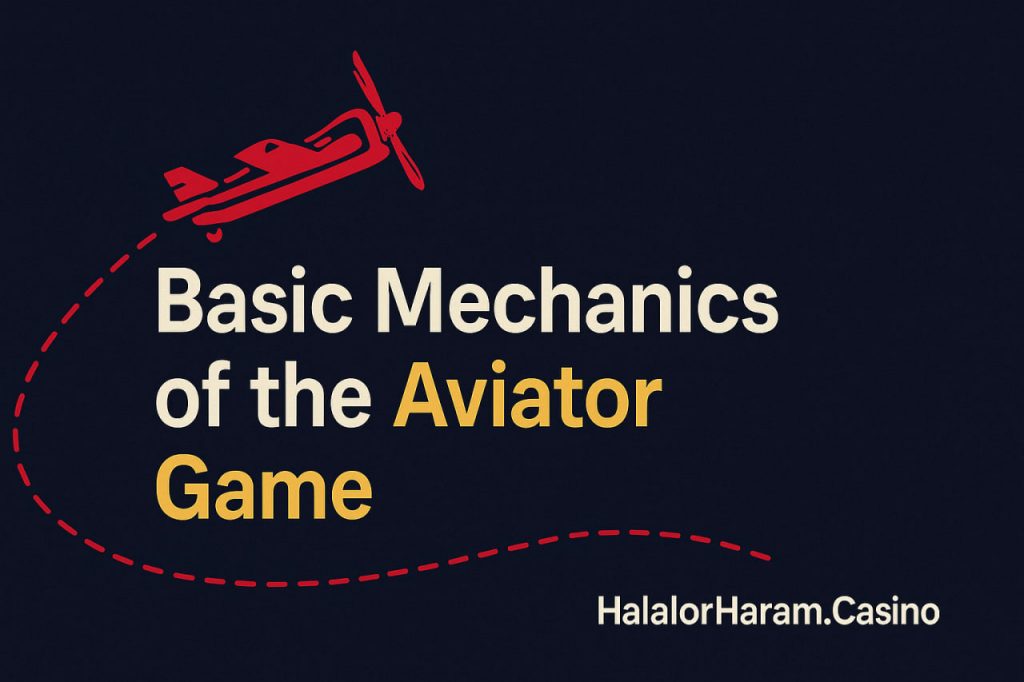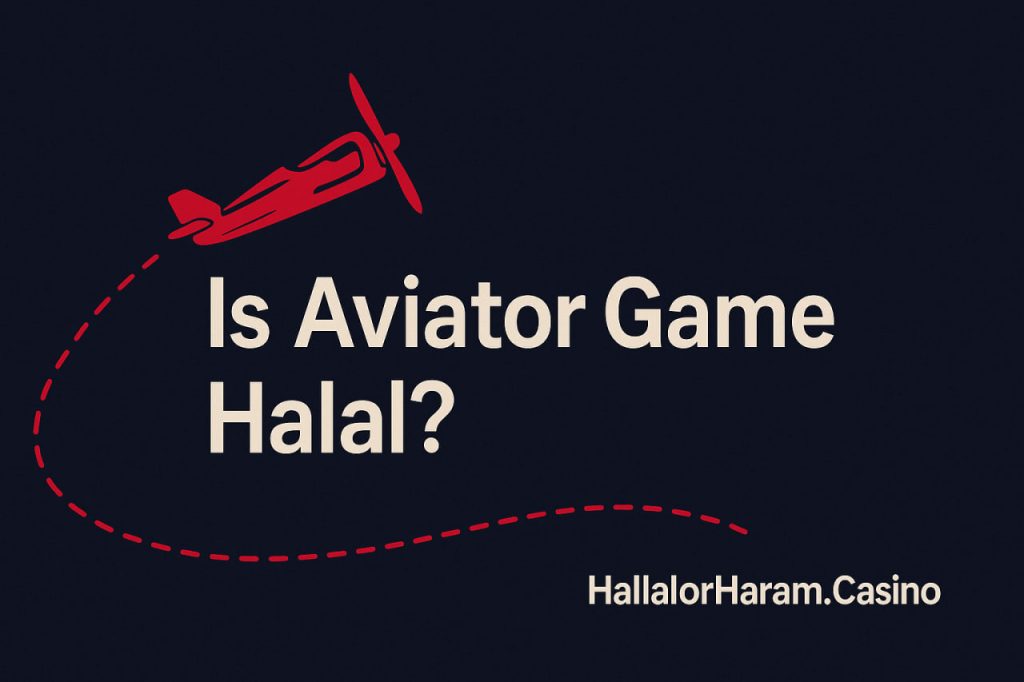Aviator Game: Is It Halal or Haram in Islam?

In today’s fast-paced digital era, online gaming has become more than just a form of entertainment—it is now a cultural phenomenon. From mobile apps and esports to online casino-style platforms, people around the globe are engaging in a wide array of games. Among the most talked-about games in recent times is the Aviator Game. This game has captured attention due to its high-risk, high-reward gameplay, which mimics the experience of gambling.
For Muslims, engaging in such games requires deep consideration of Islamic principles. A critical and essential question arises: Is Aviator Game Halal or Haram in Islam?
This comprehensive article takes a deep dive into the nature of the Aviator Game, its operational mechanisms, the ethical concerns it raises, and the opinions of Islamic scholars. We aim to provide an informative and religiously sound answer to the essential question: Is Aviator Halal or Haram? Let’s explore the topic thoroughly with attention to religious doctrine, contemporary practices, and ethical implications.
What Is the Aviator Game?
The Aviator Game is an interactive, online betting game that is typically hosted on online casino platforms or digital gambling websites. The visual concept of the game involves a digital aircraft taking off, ascending rapidly, and eventually flying off-screen. As the plane ascends, a multiplier increases on-screen in real time. Players place a bet before the plane takes off and then attempt to “cash out” their winnings before the plane disappears. If they cash out too late, they lose their entire bet.
The suspense of the game lies in the uncertainty of when the plane will disappear. The longer a player waits, the higher the potential payout, but the risk of losing everything increases simultaneously. The game resets every few seconds, leading to quick, repetitive gameplay.
Basic Mechanics of the Aviator Game:

| Feature | Description |
|---|---|
| Game Type | Multiplayer Online Betting Game |
| Core Objective | Cash out before the airplane flies away |
| Risk Factor | Extremely High – Based on real-time, unpredictable events |
| Reward System | Multiplier-based winnings, dependent on timing |
| Platform | Online Casinos, Digital Gambling Platforms |
| Input Requirement | Real money deposit or cryptocurrency participation |
| Duration per Round | 10-20 seconds per round, with instant restarts encouraging continued play |
The game’s fast-paced nature and the opportunity to make quick money appeal to many users, particularly younger demographics. Unfortunately, this also makes it prone to addictive behavior.
Play Halal-Approved Aviator Selected by Our Team
Our research team has carefully reviewed Aviator and chosen a version that meets our halal guidelines. This Shariah-verified option avoids the common gambling patterns found in standard Aviator games, so Muslim players can enjoy it with a clear conscience.
- ✔ Fully reviewed and Shariah-checked Aviator version
- ✔ Designed to avoid typical gambling elements and real-money betting
- ✔ A halal-friendly way to experience Aviator responsibly
Note: This recommendation is based on our team’s Shariah analysis and is provided for educational purposes. For personal religious rulings, please consult a qualified Islamic scholar.
Islamic Principles on Gambling and Financial Ethics
To assess whether the Aviator Game is halal or haram, we need to examine Islamic teachings on gambling, financial transactions, and ethical behavior. Islam offers a well-defined moral and legal structure concerning money, risk, and ethical conduct.
What the Quran Says:
“O you who have believed, indeed, intoxicants, gambling, [sacrificing on] stone alters [to other than Allah], and divining arrows are but defilement from the work of Satan, so avoid it that you may be successful.”
(Surah Al-Ma’idah, 5:90)
This verse serves as a cornerstone for Islamic rulings on gambling. It categorizes gambling as spiritually impure and a tool of Satan meant to sow discord and distract from righteous living.
Key Islamic Concepts:
- Maisir (Gambling): Any activity where money is staked and its return is based entirely or primarily on chance rather than effort or skill.
- Gharar (Excessive Uncertainty): Transactions involving ambiguity or a lack of clarity, often resulting in disputes or injustice.
- Riba (Interest/Unjust Enrichment): Profiting without fair risk, effort, or contribution to society.
- Halal Income: Income earned in a morally sound, transparent, and productive manner.
- Tazkiyah (Purification): Islam encourages earning in a way that purifies the soul and contributes to communal well-being.
Understanding these concepts is critical to making ethical financial and entertainment choices.
Is Aviator Game Halal?

Let’s analyze the Aviator Game through the lens of Islamic jurisprudence to determine whether it aligns with or contradicts these principles.
1. Involvement of Gambling (Maisir)
- YES: The primary objective is to stake money with the hope of a return based on a random outcome. The game is driven by chance, not skill.
- The format of the game is identical to known forms of gambling, making it fall squarely under the definition of maisir.
2. High Level of Uncertainty (Gharar)
- YES: The entire gameplay is shrouded in unpredictability. Players have no control over the algorithm that determines when the plane flies away.
- This ambiguity is considered a form of gharar, which is strictly prohibited in Islamic commercial law.
3. No Tangible or Productive Output
- YES: The game does not produce any goods, offer services, or create societal benefit.
- The winnings are earned through speculation rather than productive labor or fair trade.
4. Risk of Addiction and Psychological Harm
- YES: Like most gambling games, Aviator is psychologically manipulative, leading to addictive behavior, financial instability, and even family breakdowns.
- Islam places strong emphasis on mental well-being, self-control, and financial responsibility.
5. Mimicking Haram Behavior Even Without Real Money
- YES: Even when played in a demo version, the game trains the mind to take risky financial decisions. It desensitizes users to gambling, making it a potential gateway to haram behavior.
Scholars’ Opinions on Aviator Game
Islamic scholars from across the globe, regardless of their school of thought, have generally agreed that games based on chance and monetary reward are haram.
Summary of Scholarly Views:
| Scholar/Authority | Verdict on Aviator Game | Reason |
| Islamic Fiqh Council | Haram | Strong alignment with gambling principles |
| Al-Azhar Scholars | Haram | Encourages speculative profit, lacks economic contribution |
| Deobandi and Barelvi Ulema | Haram | Addictive, misleading, and morally corrupting |
| Contemporary Fatwas | Haram | Simulates gambling, regardless of money being real or virtual |
These views reflect a shared concern for the spiritual, psychological, and financial well-being of the Muslim community.
Final Verdict
After a detailed analysis based on the Quran, Hadith, scholarly consensus, and the very structure of the game:
The Aviator Game is Haram in Islam.

Reasons:
- It is fundamentally a game of gambling (Maisir)
- It involves intense uncertainty and speculation (Gharar)
- It offers no economic, educational, or moral benefit
- It has a high potential to cause addiction, debt, and stress
- It promotes an unhealthy attitude toward money and effort
Islam urges believers to engage in pursuits that are ethically sound, spiritually enriching, and socially beneficial. The Aviator Game does not meet any of these criteria.
Conclusion
To conclude, the question “Is Aviator Game Halal or Haram in Islam?” has been answered with extensive evidence and analysis. Based on core Islamic teachings, expert opinions, and ethical considerations, it is abundantly clear that the Aviator Game is haram.
Muslims are advised to refrain from all forms of gambling and instead participate in games and activities that uplift the soul, develop the mind, and build community. Choosing halal forms of entertainment is not just about avoiding sin but about living a life of purpose, responsibility, and spiritual awareness.
Let us strive to engage in leisure activities that bring barakah (blessing) rather than burden. May our choices reflect our values and may Allah (SWT) guide us to what is righteous, beneficial, and peaceful.
Frequently Asked Questions (FAQ)
Even without real money, the psychological effects of simulating gambling remain. It conditions users to think and behave like gamblers, which can lead to sinful actions over time. Islam emphasizes the importance of intention and mental discipline.
Yes, the majority of scholars from all major schools of Islamic jurisprudence consider it haram. Minor differences may exist in reasoning, but the end verdict is largely consistent.
Yes. Muslims can enjoy many halal games that promote creativity, strategic thinking, cooperation, and education. Examples include puzzle games, simulation games, and quizzes.
Absolutely. Islam teaches that no sin is beyond forgiveness. If one sincerely repents, seeks forgiveness, stops the act, and commits to not returning to it, Allah (SWT) promises mercy and acceptance.
No. Unlike business ventures or professional gaming, Aviator lacks elements of skill, planning, or tangible value. It is entirely speculative and therefore not comparable to halal investments.

User Reviews
I always avoided Aviator because of the gambling aspect, but this site helped me find a Shariah-verified version. I'm really happy I can finally enjoy the game in a halal way.
Your halal review of Aviator was extremely helpful. I appreciate how clearly everything is explained. The Shariah-compliant version recommended here works perfectly for Muslim players like me.
I didn’t know there was a non-gambling version of Aviator until I found this site. The halal option you suggested lets me play without worrying about haram elements. Very grateful for this resource!
Amazing work! The halal Aviator version recommended here is exactly what I was looking for. It’s nice to have a trustworthy place that checks games for Shariah compliance.